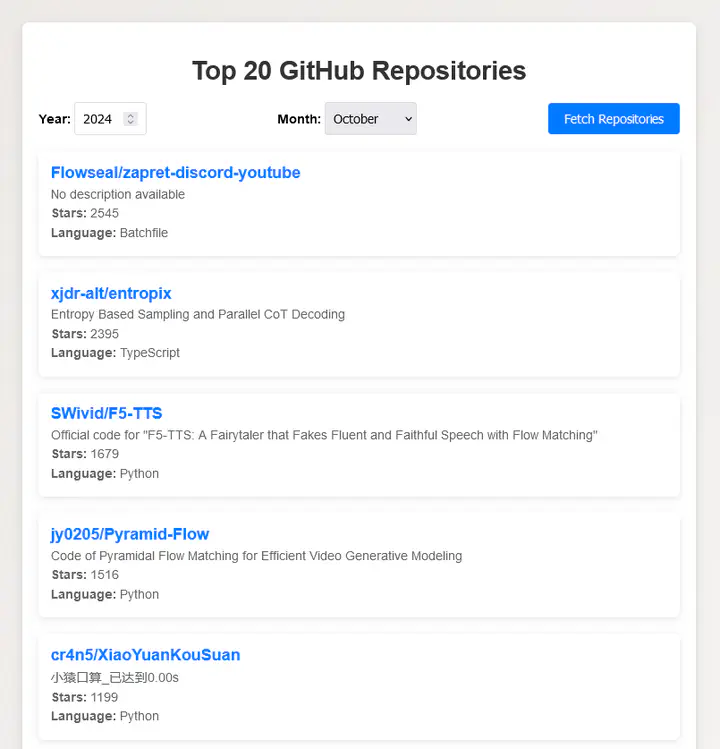
This project is a simple web application that fetches the top 20 GitHub repositories for a specific month and year, using the GitHub API. Users can select the year and month to view the most popular repositories for that period.
The app is built using Go (Gin) for the backend, HTML, CSS, and JavaScript for the frontend, and provides a clean, modern UI with hover effects and smooth transitions.
Table of Contents
- Features
- Technologies
- Installation
- Running the App
- Using Docker
- Project Structure
- Usage
- Contributing
- License
Features
- Fetches the top 20 repositories from GitHub for a specific month and year.
- Users can select the month and year from a simple form.
- Clean, modern UI with hover effects and smooth transitions.
- Data is fetched from the GitHub Search API.
- Repository details include name, description, star count, and programming language.
- Repository names link to the actual GitHub repository.
- Docker integration for easy setup and deployment.
Technologies
- Backend: Go (Gin framework)
- Frontend: HTML, CSS, JavaScript
- API: GitHub REST API v3
- Containerization: Docker (multi-stage build)
- Dependencies:
github.com/gin-gonic/ginfor the web server.
Installation
Prerequisites
Clone the Repository
git clone https://github.com/k1lgor/github-trends.git
cd github-trends
Install Go Modules
Run the following command to download the necessary dependencies:
go mod tidy
Running the App
Start the Server
To start the server, use the following command:
go run cmd/github-trends/main.go
By default, the app will run on http://localhost:9090/.
Access the Web Interace
Open a browser and go to:
http://localhost:9090
Using Docker
You can run the application in a Docker container using the provided Dockerfile. The Dockerfile is set up with a multi-stage build to create a lightweight and efficient Docker image.
Build the Docker Image
- Make sure you are in the root directory of the project.
- Build the Docker image using the following command:
docker build -t github-trends .
This command uses the multi-stage Dockerfile to compile the Go application and create a small, production-ready Docker image.
Run the Docker Container
Once the Docker image is built, you can run the application in a Docker container:
docker run -p 9090:9090 github-trends
This command maps port 9090 on your local machine to port 9090 in the Docker container. The application will be accessible at http://localhost:9090
Project Structure
github-trends/
├── cmd/
│ └── github-trends/
│ └── main.go # Entry point for the Go server
├── internal/
│ ├── api/
│ │ └── api.go # API routes and Gin server setup
│ ├── config/
│ │ └── config.go # Configuration loader (using Viper)
│ ├── fetcher/
│ │ └── fetcher.go # Logic to fetch GitHub repositories
├── web/
│ ├── templates/
│ │ └── index.html # Frontend HTML page
│ └── static/
│ ├── css/
│ │ └── style.css # Styles for the frontend
│ ├── js/
│ │ └── script.js # JavaScript logic for fetching and displaying repos
├── go.mod # Go module dependencies
├── go.sum # Go module checksum file
├── Dockerfile # Dockerfile with multi-stage build
└── config.yaml # Optional config file for GitHub API key
Usage
- Select Year and Month:
- Use the input fields to select the year and month for which you want to view the trending repositories.
- Click the Fetch Button
- Click the Fetch Repositories button to retrieve the top 20 repositories for that month.
- View Repository Details:
- The repositories will be listed with the following details:
- Repository Name (clickable link to GitHub)
- Description
- Star Count
- Programming Language
Contributing
Contributions are welcome! If you’d like to contribute to this project, please follow these steps:
- Fork the repository.
- Create a feature branch (
git checkout -b feature-name). - Commit your changes (
git commit -m 'Add new feature'). - Push to the branch (
git push origin feature-name). - Open a pull request.
License
This project is licensed under the MIT License - see the LICENSE file for details.